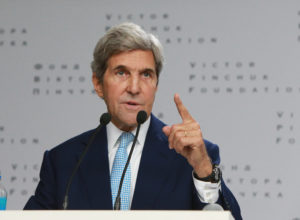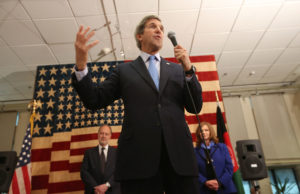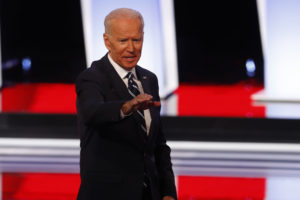Yes, I’m Listening to Kerry
Regardless of his shortcomings as a presidential candidate, Sen. John Kerry has a plan for extricating America from Iraq that is worth paying attention to.WASHINGTON — Not long after the “botched joke” blew that gaping hole through John Kerry’s political ambitions, I called a Democratic friend and made a promise: I will never, ever, say anything nice about Kerry again.
Promise made, promise broken.
Within a few days, Kerry is to offer the Senate yet another chance to consider what always have been his well-informed — and often wise — ideas for how to manage the disaster that is Iraq. The media shorthand will be that Kerry calls for “withdrawal.” The Massachusetts senator is, indeed, working on a measure that will most likely set deadlines for redeploying American troops and outline a diplomatic thrust that is so urgently and obviously needed to quell a civil war that threatens to become a regional conflagration.
It is worth noting that when Kerry proposed a similar approach last June, most of the political commentariat ridiculed him as pandering to antiwar activists, a supposedly crucial bloc of support needed for a 2008 Democratic presidential run. Kerry’s resolution went down by a vote of 86 to 13. Republicans were still echoing White House talking points that ridiculed all alternatives as “cut and run.” Most Democrats were still cowering.
Now, having given up his dream of becoming president, Kerry is more public servant than politician. He has reached down inside to tap that same quality that led him to volunteer for duty in Vietnam when others of his social status found safe havens from the fight. It is the same impulse that led him to win medals for his valor, the same courage that led him to return home to protest a dirty war when he could have tucked away his medals and marched off to law school.
It is, in fact, a quality we are always saying we want in a president: character.
The prospects for a second Kerry presidential bid were poor, and this was painfully obvious. The prospects for a winning vote in the Senate on firm deadlines for redeploying the American forces besieged in Iraq are, in all likelihood, equally bleak. Senators from both parties bicker instead over the wording of nonbinding resolutions expressing varying degrees of displeasure with President Bush’s decision to send in more troops. Should the Senate “oppose” the president’s policy, or merely “disagree”?
No matter. Bush will ignore them. All senators know it. This is the heart of our national political crisis.
It has now been 14 months since Rep. John Murtha, D-Pa., the defense hawk who supported the 2002 resolution that authorized the Iraq invasion, called Bush’s approach in Iraq “a flawed policy wrapped in illusion.” Is it now less flawed, less shrouded beneath the illusions that envelop the White House?
More than two years have passed since Kerry first outlined, as part of his presidential bid, a regional diplomatic initiative to involve Iraq’s neighbors. Its goals would be to keep Iraq’s borders intact, prevent outside interference in Iraq’s internal affairs and protect its minorities. Last fall, the bipartisan Iraq Study Group endorsed the same approach.
Who can say whether Kerry’s new redeployment plan will set the right course out of Iraq? There is no risk-free way to extricate ourselves from this bloody folly. We can be more certain that President Bush will continue to stumble ahead, sacrificing American and Iraqi lives on the pyre of his determination to avoid responsibility for defeat.
As for Kerry, we no longer have to worry about his windsurfing or the size of his wealthy wife’s investment portfolio. The idiotic discourse that consumed the media during the 2004 presidential campaign is exposed, fully and tragically, as the bread and circuses of our day. The diversions were more than the smearing of an honorable man. They were disastrous for the country, for they blinded so many to what already was a deepening state of chaos in Iraq.
Now that we have no particular reason to listen to John Kerry, will we?
Certainly we should. The attentiveness should begin in the Senate, where Kerry announced he would not seek the presidency and returned instead to his political roots as an unconstrained opponent of a failed war. He reminded his colleagues of what they all know and have refused thus far to admit: “The mistakes of the past do not change the fact that Congress bears some responsibility for getting us into this war and, therefore, must take responsibility for getting us out.”
Marie Cocco’s e-mail address is mariecocco(at symbol)washpost.com.
Copyright 2007, Washington Post Writers Group
Your support matters…Independent journalism is under threat and overshadowed by heavily funded mainstream media.
You can help level the playing field. Become a member.
Your tax-deductible contribution keeps us digging beneath the headlines to give you thought-provoking, investigative reporting and analysis that unearths what's really happening- without compromise.
Give today to support our courageous, independent journalists.






You need to be a supporter to comment.
There are currently no responses to this article.
Be the first to respond.